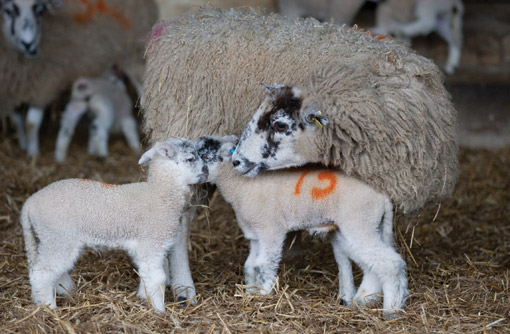Tips to prevent ewe mastitis during cold weather

Farmers are being warned to be extra-vigilant for signs of ewe mastitis at times of extreme weather.
Up to 5% of ewes are affected by mastitis each year, with cases generally developing in the first week after lambing and at peak lactation, which can rapidly progress to death.
Extreme cold weather and a limited supply of feed during peak lactation could put pressure on ewe condition and milk yield.
This, combined with contamination of the udder by mud and aggravation by cold winds, could increase the risk of acute mastitis, explains EBLEX senior livestock scientist Liz Genever.
“Another important risk factor is teat lesions caused by hungry lambs, which is a particular problem when the ewe’s milk yield is dropping as their demand is increasing,” she says.
Dr Genever suggests introducing certain lambs on to creep feed to help meet their rising demand and to reduce the risk, but this will depend on the farm’s individual system and when lambs are being marketed.
Effective treatment for mastitis depends on a rapid response to save the life of the ewe, although it is unlikely to save udder function.
Veterinary consultant Fiona Lovatt advises the following to prevent ewe mastitis
- The ewe should be brought in and penned individually, so good care can be given to both her and her lambs, which will need supplementary feeding. She needs access to plenty of clean water and may need to be tempted to eat
- Vet advice should be sought and usually their recommended treatment is an injectable antibiotic and an anti-inflammatory drug
- The infection can be within the milk, the udder tissue or the inflammatory cells. Ideally the antibiotic needs to reach each of these locations and remain at high enough levels to achieve a cure
- Some effective drugs can be given only by vets, which is obviously an extra expense but may be worthwhile for a valuable ewe
- Long-acting antibiotics can be useful as it means it is not necessary to treat every day, although, of course, the ewe should be checked regularly
- It could be worth talking to your vet about anti-inflammatory drugs, as they reduce pain and the amount of toxin produced by the bacteria that causes mastitis
- Some vets may also prescribe antibiotic tubes to be injected into the teat. If these are to be used then it is essential that very strict hygiene is adhered to
